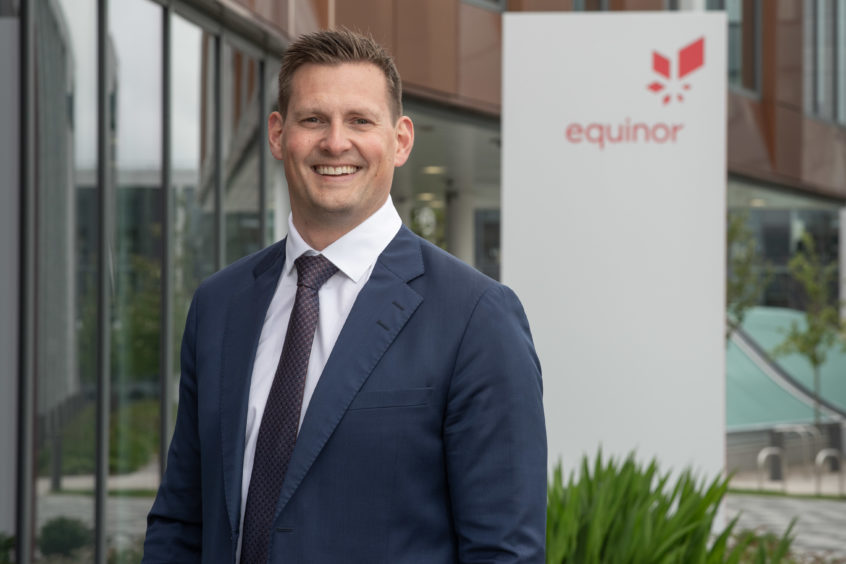
Other countries are “the winners of the energy transition” as low carbon projects in the UK are stalled by government red tape, an energy boss has warned.
Arne Gurtner, Equinor UK vice president, shared his frustrations over delays to key projects caught up in “highly regulated systems and processes” at the Energy Exports Conference in Aberdeen as the country looks to an upcoming general election.
The Norwegian state-backed Equinor is a partner in the East Coast Cluster which was designated a front-runner carbon capture and storage project in 2021.
The East Coast Cluster and HyNet took a share of a £1 billion government investment pot to get up and running by the mid-2020s however projects that received backing are still waiting to get off the ground.
Mr Gurtner said: “Things tend to take a longer time in the UK, there’s also a sense that goal posts are moved.
“We’re still waiting on Track 1 of carbon capture, that was the prime market for us and we’re still in the process and we’re eager to drive it, but it takes longer than we thought it would.”
Looking to other countries that are more “market based”, Mr Gurtner said that projects abroad are “pushing through a bit quicker.”
Due to this, these markets are “the winners of the energy transition,” he added.
The UK Equinor boss said: “I think that’s just representative for a lot of highly regulated systems and processes. It takes a lot of time to get right and you need a a lot of upfront investment.
“You need to hold your nerve, you need to keep money prepared in your accounts to put to the project when it’s sanctioned and that makes it difficult.”
The East Coast Cluster
The East Coast Cluster, one of the Track 1 projects, aims to decarbonise industrial emissions around the Humber and Teesside.
It has the potential to transport and securely store nearly 50% of all UK industrial cluster CO2 emissions – up to 27 million tonnes of CO2 emissions a year by 2030.
The East Coast Cluster is aimed at supporting 25,000 jobs per year between 2023 and 2050, with approximately 41,000 jobs at the project’s peak in 2026.
Equinor is also involved in the connected H2H Saltend project which aims to produce 600MW of low carbon hydrogen from the Humber region.
Due to be operational around the end of the decade and sited at the energy intensive Saltend Chemicals Park, H2H Saltend will set out to reduce the park’s emissions by up to one third.
NSTA plans for two projects to be sanctioned by December
Alistair Macfarlane, manager of UK carbon transportation and storage for the NSTA, told Energy Voice late last year that the regulator expects to have projects off the ground by December 2024.
It is understood that this is still the timeframe the regulator is working to.
Recent analysis from Carbon Tracker found that the UK government’s carbon capture, utilisation and storage (CCUS) strategy is based on “outdated and unrealistic” assumptions.
The ‘CCUS Vision’ sets out how the UK will transition the sector from early state-supported projects towards a competitive market from 2035.
Based on recommendations from the independent Climate Change Committee’s Sixth Carbon Budget, released in 2020, the strategy includes for £20 billion in support for the CCUS sector.
However, the Carbon Tracker report found that since 2020 cost estimates for deploying CCUS have more than doubled.
Rosebank waited three months for regulator approval
It is not just renewables projects that are being caught in the weeds of UK policy.
Oil and gas projects have previously waited months for approval. This is something Equinor is all too well aware of.
The Norwegian firm’s controversial Rosebank project had three-month wait for regulator approval.
The NSTA which has final sign-off, was told on June 16 that environmental regulator OPRED and the UK energy secretary had granted their own consent.
Approval for the Equinor-operated West of Shetland oilfield was granted by the NSTA on 27 September.
At the time the UK regulator explained it does not comment on individual cases but, in general terms, the NSTA said:
“The consent system is thorough and rigorous and designed to support the development of the North Sea and the work of operators.
“Every project is unique and assessed on its own merits and the time taken to reach a decision is dependent on a project’s characteristics.”
Recommended for you

